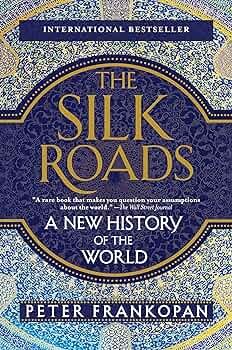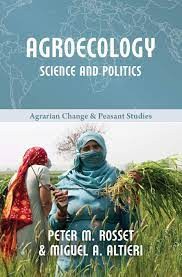In a random bookshop in Kathmandu I came across "The Silk Roads: A New History of the World" (2015) by Peter Frankopan. Having taught Global Political Economy in the past and gone through a number of textbooks (which are largely centered on the Euro-West and its perspectives on global matters) I was hoping this book might be a new look at history. For several chapters, the book takes a thematic approach (flow of theological ideas, flow of commodities) and others are issue based (revolution, war, colonization). While there might be relatively more focus on Central Asia and Asia compared to other renderings of world history, it is not immediately clear what is new per se. The Americas and Africa largely remain without a history, unless in the context of conquest or colonization, following the tradition of Hobbes. This is a mass market book (Bloomsbury), but includes 100 pages of notes (book is 636 pages). For a specialist of a region or issue or commodity, the book contains some errors or over simplifications and could be frustrating; for a generalist interested in an introduction to world history, this could be a useful book. A few notes:
"The willingness to adopt new ideas and practices was an important factor in enabling the Persians to build an administrative system that allowed the smooth running of an empire which incorporated many different peoples. A highly educated bureaucracy oversaw the efficient administration of the day-to-day life of the empire, recording everything from payments made to workers serving the royal household, to validating the quality and quantity of goods bought and sold in market places; they also took charge of the maintenance and repair of a road system criss-crossing the empire..." (p. 1-2)
"The Islamic conquests created a new world order, an economic giant, bolstered by self-confidence, broad-mindedness and a passionate zeal for progress. Immensely wealthy and with few natural political or even religious rivals, it was a place where order prevailed, where merchants could become rich, where intellectuals were respected and where disparate views could be discussed and debated." (p. 101)
"By the early fourteenth century, Timbuktu in particular was not just an important commercial centre but a hub for scholars, musicians, artists and students who gathered around the Sankoré, Djinguereber and Sīdī Yahyā mosques, beacons of intellectual discourse and home to countless manuscripts collected from all over Africa. Not surprisingly, the region attracted attention from thousands of miles away. There had been gasps in Cairo when Mansa Musa - or Musa, King of Kings of the Malian Empire - 'a devout and just man' whose like had not been seen before, passed through the city in the fourteenth century on his way to Mecca on pilgrimage, accompanied by an enormous retinue and carrying huge amounts of gold to give as presents. So much was spent in the markets during his visit to the city that a mini-depression is supposed to have been triggered across the Mediterranean basin and in the Middle East as the price of bullion apparently plummeted under the pressure of the huge inflow of new capital." (p. 203-204)
"The native populations in the Caribbean and the Americas were devastated. Within a few short decades of Columbus' first voyage, the numbers of the indigenous Taíno people fell from half a million to little more than 2,000. This was in part due to ferocious treatment at the hands of those who began to style themselves as 'conquistadors' - or conquerors - such as Hernán Cortés, whose bloodthirsty expedition to explore and secure Central America resulted in the death of the Aztec ruler, Moctezuma, and the collapse of the Aztec Empire. Cortés stopped at nothing to enrich himself. 'I and my companions', he told the Aztecs, 'suffer from a disease of the heart that can be cured only with gold.'" (p. 213)
"The underlying secret to Dutch success in the seventeenth century was common sense and hard work. The Dutch reckoned that the way to work was not to follow the example of England, where the chartered companies used sharp practices to limit beneficiaries to a small circle of intimates, all looking after each other's interests and using monopoly positions to protect their positions. Instead, capital was pooled and risks shared among as wide a body of investors as possible. In due course, the conclusion was reached that despite competing ambitions and rivalries between provinces, cities and indeed individual merchants, the most efficient and powerful way to build up trade was by combining resources." (p. 255)
"Aware that their hold over the Gulf region was tenuous, the British made overtures to leading figures in the Arab world, including Husayn, Sharīf of Mecca, who was offered a tempting deal: if Husayn 'and the Arabs in general' were to provide support against the Turks, then Britain 'will guarantee the independence, rights and privileges of the Sharifate against all external foreign aggression, in particular that of the Ottomans'. That was not all, for another, even juicier incentive was offered up too. Perhaps the time had come when 'an Arab of true race will assume the Caliphate at Mecca or Medina'. Husayn, guardian of the holy city of Mecca and a member of the Quraysh, and descendant of Hāshim, the great-grandfather of the Prophet Muammad himself, was being offered an empire in return for his support. The British did not really mean this, and nor could they really deliver it. However, from the start of 1915, as things took a turn for the worse, they were prepared to string Husayn along..." (p. 335)
"Three possible triggers were envisaged - all of which could justify military action. Perhaps Saddam "moves against the Kurds in [the] north?', wondered Donald Rumsfeld in November 2001 ; maybe a "connection to Sept 11 attack or to anthrax attacks" (following mailings to several media outlets and to two US senators in September 2001); or what if there were a "dispute over WMD inspections?" This seemed a promising line – as revealed by the comment that follows: "Start now thinking about inspection demands." ... Particular emphasis was given to building up the case that Iraq was not just determined to make weapons of mass destruction but was doing so covertly and obstructing inspectors from the International Atomic Energy Agency (IAEA) at the same time. In some cases, this created problems with the monitors themselves, who found their positions overstated, compromised or even at risk altogether. In the spring of 2002, for example, Jose Bustani, the Brazilian director-general of the Organization for the Prohibition of Chemical Weapons, was ousted following a special closed session - this was the first time the head of a major international organization had been forced from their position. Information gathered from one-off and often unreliable sources was given primnance, and speculation was presented as fact, the result of a single-minded determination to make the case against Iraq and Saddam appear watertight. 'Every statement I make today', Colin Powell told the UN on 5 February 2003, 'is backed up by sources, solid sources. These are not assertions. What we're giving you are facts and conclusions based on solid intelligence.'" (p. 502)





